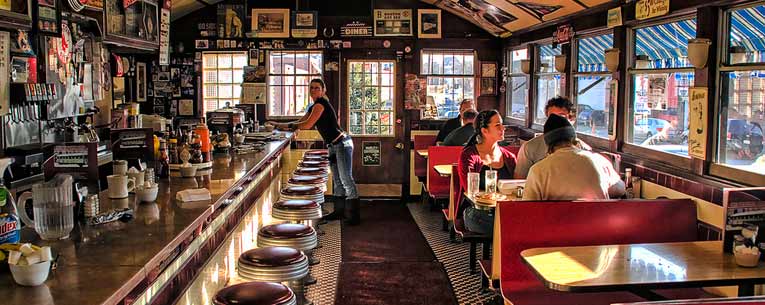Are you hitting the road? How does your waistline and digestive system feel about that? Traveling is a memorable, fun and rewarding experience, but it can also be tough. You often find yourself hungry with tempting foods and unhealthy dining options around you, with healthy choices few and far between.
However, you don't have to gain 10 pounds and jump through digestive hoops every time you leave home. Lots of common road food is easy on the tummy, and with a little bit of prep work, you can pack your own snacks that keep you fueled and healthy for hours of driving and exploring.
> Renting a car? Get a quote for Rental Car Damage Protector
Healthy Options
Find something nutritious to munch on, no matter where you are.
At Rest Stops
Typically, a highway rest stop has a vending machine, and that's about it. Most vending machine snacks aren't the healthiest (M&Ms, anyone?), but it is possible to find options that won't leave you starving again an hour later.
As a first choice, look for packaged nuts or seeds. Although they're often coated with more salt than necessary, both nuts and seeds offer a healthy combination of filling protein, fiber and healthy fats. Other healthy options are popcorn, baked chips, trail mix or whole grain crackers.
At Gas Stations
Compared to a rest stop, a gas station can seem like a regular grocery store. In addition to an aisle of standard snacks, you can usually find a decent selection of granola bars, trail mixes and even a section of refrigerated goods or whole fruits.
Protein-packed snacks are among the best at staving off hunger pangs. Near the milk and juice, look for cartons of plain yogurt. Bonus points if you can find Greek-style yogurt, which can as much as double the protein of regular yogurt in a single serving.
If you're craving something sweeter, walk past the candy bars and search for a bottled fruit smoothie. Check out ingredient lists, and try to find one made all or mostly from pureed fruit, with no added sugar.
At Roadside Diners
It's an unwritten rule that you're supposed to indulge every so often when you're on vacation, but that doesn't mean every meal needs to include a collection of fried foods and a king-sized sundae. Roadside diners are notorious for their unhealthy offerings, but if you read through a menu carefully, you can almost always find something that won't send your cardiologist into a panic.
Salads are a good starting point. Order dressing on the side, and try to find or ask for options that have a greater variety of greens and veggies than just iceberg lettuce. For an entree, order something that's grilled or broiled, such as chicken breast or salmon. It has less saturated fat than a fried option.
If there's any wiggle room in your route, check out what's nearby on HappyCow.net, a search tool and worldwide map for restaurants that offer vegetarian, vegan and other healthy eating options.
Bring Your Own Grub
There's always a lot of important stuff to do right before a trip, like packing, getting your travel insurance and printing out tickets. Taking a few extra minutes to prepare some snacks to bring with you will pay off later, when hunger strikes, and you're stuck in traffic or can't find any place that seems to be open.
Smart, nonperishable options that you can throw together and pack include:
- Trail mix
- Granola bars
- Protein powder or other drink mixes
- Crackers
- Whole grain tortillas or breads
- Dry cereal
- Dried fruit or fruit leathers
More perishable options that will last for several hours to several days include:
- Fresh fruit
- Fresh veggies
- Hard cheeses, such as cheddar
- Hard-boiled eggs
When packing, consider both when you're going to eat the snack and how perishable it is. Throw soft or fragile items, like bananas and hard-boiled eggs, on top of bags for easy accessibility. Are you bringing homemade bars or bread? Wrap them in waxed paper or aluminum foil, then put them in a plastic bag to preserve their freshness for the maximum possible time.
Dried fruit, protein powder, cheese and most veggies are fine in individually portioned zip-top bags, but granola or dry cereal can easily get crushed to a powder that way. Instead, consider packing those items in glass Mason jars wrapped in soft clothing, or keep them in cardboard cereal boxes, which are sturdier than bags.
Finally, always pack more water than you think you need, and sip it regularly throughout your trip. Your body can easily mistake hunger for thirst, which means if you're even a little dehydrated, you're likely to feel like eating even if you aren't actually hungry. Carry a water bottle with you everywhere you go, refill it as needed, and drink a few ounces before every meal to help lessen your hunger.
Do you need more information? Allianz Travel Insurance has you covered for every trip. Learn everything you need to know about travel insurance, including coverage details, reasons to buy and how to find the right plan for you.
Related Articles








Share this Page